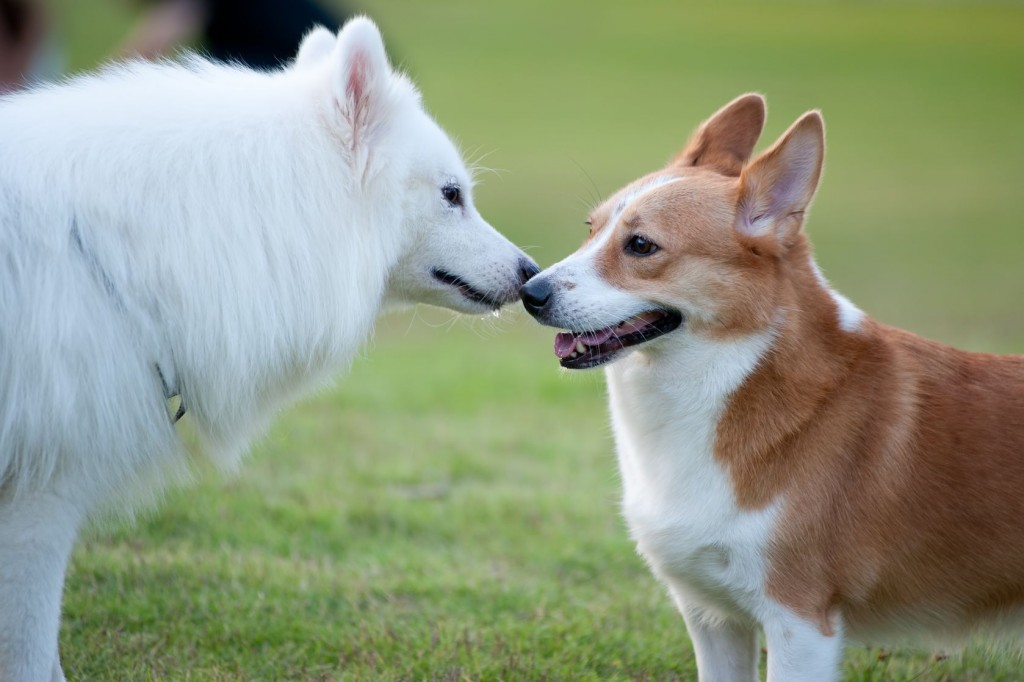
While dogs can learn good social skills at a daycare or dog park, they can just as easily learn poor social skills in these largely-unsupervised situations.
All dogs at a daycare facility will be tested for temperament to make sure they have good social skills before entering the daycare environment. While your dog may be social, a daycare environment can still become overwhelming to some dogs, and certain negative traits can be exposed.
On the other hand, anyone can bring their dog to a dog park. Unfortunately, some owners either ignore unsocial or unacceptable social behavior simply because they do not see it as an issue, or they are not experienced enough to decode their dog’s behavior or body language.
Dogs in a pack act very differently than they do individually. Even a well-socialized dog of good temperament can be drawn into “pack behavior” and become overstimulated. A pack environment can bring out the worst behaviors; a dog that is fearful around other dogs can become even more skittish in a large pack of rowdy dogs. By the same token, a pushy dog may bully other dogs without having a human closely monitoring to correct this behavior.
There’s no way to predict or know the behavior of the other dogs in the group at a park. Many people take their dog to parks with little understanding of their own dog’s tolerance level for other dogs. There is often an expectation that “dogs will work it out;” however, this can occur in a way that results in injury.
Dogs playing together for long periods of time in large groups with unstructured time or activities can result in inappropriate behavior. Some examples of inappropriate behavior that may develop or become “learned behavior” when unsupervised are: mounting other dogs, antagonizing other dogs (verbally, body posturing, or physically by bumping or snapping), destructive chewing, and excessive barking.
Dog playgroups need to be carefully selected by competent readers of dog body language and with an understanding of social canine behavior. Unfortunately, when we then add in pit bulls, the intensity goes up tenfold. If something does go wrong, whether or not the pit bull instigates it, they are usually blamed; every negative incident reflects not only on the individual dog, but on pit bulls as a whole.
If provoked in a fight, some dogs will not back away from a challenge. Whether your dog is the victim or the instigator, a negative incident can result in future problems during dog-dog interactions. For example, if a small dog goes to a dog park, antagonizes, and acts aggressively towards a pit bull (or other large breed dog), and the two owners ignore the situation or think “they’ll work it out”, eventually the larger dog will reach it’s tolerance level and react back to the smaller dog. Sadly, those at the park will almost always see the situation like a news headline of “Pit Bull Attacks Small Dog.”
Daycare is often a better choice for socialization because it is important that socialization takes place in small, well-matched groups — whilst always being monitored and with unwanted behavior quickly being corrected. Go with your instincts, if the energy is building too high, then stopping the play with a time-out is required. Play every so often, because it reinstates you’re in charge and are calling the shots, it also teaches your dog what are acceptable levels to play at.
Always remember that when dogs are playing, they are actually play-fighting; like two boxers sparring, the dogs are working out who is faster, stronger, and more agile, but in a controlled manner. Remember if the dogs are over stimulated, it doesn’t take much to spill over into an all-out brawl.
The best way to avoid issues is to take your time to learn and read your dog’s sociability levels, and to always set them up for success. Don’t set them up for failure by taking them to places where they might be nervous or overstimulated, and avoid places where you don’t have control of the pack; when you are not in control, one of the dogs in the pack will take that leadership role from you.

















